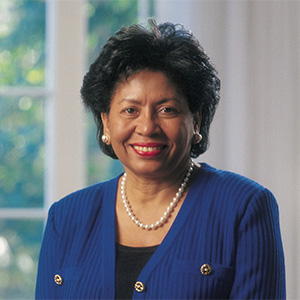
Scholar and academic leader Ruth J. Simmons, PhD, will deliver the second annual James E. McLeod Memorial Lecture on Higher Education at 5 p.m. Monday, Sept. 30. The Assembly Series event will be held in Graham Chapel on Washington University in St. Louis’ Danforth Campus.
Her talk, “The State of Conscience in University Life Today,” addresses the importance of the liberal arts in higher education, a principle the late, beloved WUSTL teacher and administrator Jim McLeod held dear.
Co-sponsored by The Center for the Humanities, Office of the Provost, and the College of Arts & Sciences, the lecture is free and open to the public.
Apropos to Jim McLeod’s belief in the power of individual stories, Simmons’ is remarkable and inspiring. The 12th child of Texas sharecroppers, she embarked on an educational journey that led to a doctoral degree in Romance languages and literatures from Harvard University and launched her long and distinguished career.
She has held a number of faculty and administrative appointments in some of the leading educational institutions in the country, including the University of Southern California, Princeton University, Spelman College and Smith College.
As president of Smith, Simmons established important initiatives such as an engineering program for the women’s college.
As president of Brown University from 2001 to 2012, Simmons became the first African American to hold the highest post at an Ivy League institution. She continues to teach comparative literature and Africana studies at Brown.
Because of Simmons’ leadership on major public policies affecting higher education, she has been a featured speaker at the White House, the World Economic Forum, the Brookings Institution, and the Clinton Global Initiative. She is the recipient of many honors and holds membership in the American Academy of Arts and Sciences, the American Philosophical Society and the Council on Foreign Relations.
McLeod, who came to Washington University in 1974, served as vice chancellor for students and dean of the College of Arts & Sciences until his death in 2011. He is widely considered one of the university’s greatest leaders whose impact will be felt for generations.
For more information on this and other Assembly Series programs, visit here or call (314) 935-4620. For more information on Center for the Humanities events, visit here.